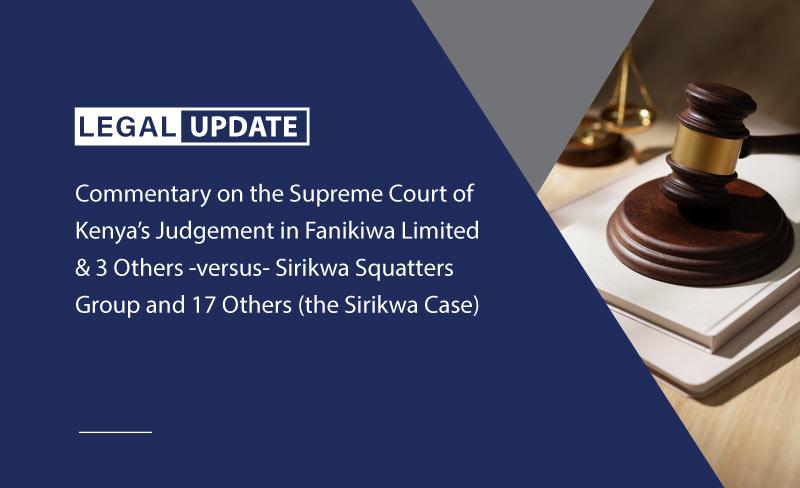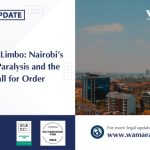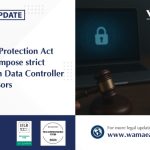“…once an individual or entity acquires any unalienated government land, or other land for that matter, consequent upon registration of title, in accordance with the provisions of the applicable law, such land transmutes from public to private land…such land is as a consequence, removed from the ambit and confines of the GLA to the new legal reg9me conferring title to an entity other than the government and on such terms as shall be inscribed on the new title. It follows therefore that the subject suit parcels, being land that was at the time private property vested in Lonrho Agribusiness did not fall within the care gory of ‘unalienated government land’ envisaged under the GLA and former President Moi had no legal capacity and authority to allocate or confer any legitimate interest in the subject suit parcels to members of Sirikwa or any other entity.” Supreme Court Judges.INTRODUCTION
The year 2023 has proven to be pivotal in the Supreme Court, especially concerning matters of land rights and ownership. Three landmark decisions of profound jurisprudential significance have been handed down: Dina Management Limited vs. County Government of Mombasa & 5 Others [SC Petition No.8 (E010) of 2021] – “The Dina Management case,” Torino Enterprises Limited v Attorney General [Petition 5 [E006] of 2022] – “Torino case,” and the most recent, the Sirikwa case, as cited in the title.
This article meticulously explores the contested facts and issues presented before the Court, subjecting the decision to a thorough scrutiny in light of various legal principles. In conclusion, we will expound on the ramifications and significance of decision for real-estate stakeholders, particularly lenders and property owners, drawing connections to the precedent set by the Torino and Dina Management cases
SUMMARY OF THE FACTS & ISSUES
The Titles (leasehold interest) to the suit property was first issued to Plateau Wattle Company Ltd under the Registration of Titles Ordinance (and eventually referred to as Registration of Titles Act-repealed). It later transferred the property to East Africa Tanning Extract Company which eventually changed its name to Lonrho Agribusiness (East Africa) Limited.
Lonrho Agribusiness surrendered the titles to the property in 2000 to the government. Upon the surrender, the titles were registered under the Registered Land Act- RLA (now repealed) and freehold titles were issued in favour of Lonrho Agribusiness. Lonrho Agribusiness eventually sub-divided the suit property and transferred the resultant parcels to third parties.
The purpose of the surrender of the titles was the crux of the dispute. Sirikwa claimed that they were promised the suit property by the Late President Moi and the surrender of the titles were meant to actualize that intention. They filed a petition at the High Court which was later transferred to the Environment & Land Court (ELC). They submitted that upon the surrender, the suit property reverted to the government and could only be managed under the Government Land Act- GLA (now repealed) and not the RLA. They further submitted that they had a legitimate expectation to be allocated the suit property upon the surrender. They argued that the subdivisions and the eventual transfers violated its members’ rights to property.
Lonrho Agribusiness on the other hand argued that the surrender was for the purpose of conversion of their tenure and registration regime from leasehold under RTA to freehold under RLA and subsequent subdivision and transfer. The ELC agreed with Sirikwa and canceled all the resultant titles from the subdivisions and transfers. However, the Court noted that Mark Too was entitled to 27 Hectares of the suit property.
Fanikiwa Limited, which was not a party at ELC, but however aggrieved by the decision of the ELC filed an appeal contesting the cancellation of its titles without being accorded the right to be heard. Lonrho Agribusiness and Administrators of the Estate of Makr Too also filed appeals. The Court of Appeal (CoA) heard the consolidated Appeal. 78 individuals and 7 financial institutions (holding charges) were also joined in the Appeal.
Sirikwa also filed a cross appeal disputing the ELC’s decision to sanctify the 27 Hectares issued to Mark Too. The CoA dismissed the consolidated appeal and allowed Sirikwa’s cross appeal, indicating that the subdivision and transfers were illegal and could not enjoy protection of the law. Nonetheless, the CoA sanctified the titles held by the 78 individuals and 7 lenders as they were protected by the doctrine of Innocent purchasers for value without notice.
Aggrieved, Fanikiwa Limited, the administrators of the estate of Mark Too and Lonrho Agribusiness & David Korir filed their respective appeals to the Supreme Court, which were later consolidated. The appeals were brought under Article 163(4)(a) of the Constitution as of right and involving the interpretation and application of the Constitution.
The main issues for determination were to wit, whether the appeal met the threshold under Article 163(4)(a); whether the 1st Appellant’s right to fair hearing was violated by the Appellate court’s decision to cancel its titles; whether the proceedings ought to have been taken through Viva Voce Evidence; whether Sirikwa had legitimate expectation, whether Sirikwa had a right to property on account of its members being squatters on the suit property and what was the purpose of the surrender.
For clarity, in our analysis herein below, we dissect the court’s decision into three broad categories which in our view addresses all the issues.
VIVA VOCE EVIDENCE
The Supreme Court was not convinced by the trial court’s decision to hear the matter by way of affidavit evidence and noted that it was prudent and judicious, considering the highly contentious nature of the claims and circumstances of each of the numerous parties involved to determine the matter by affidavit evidence.
We do not agree by the above sentiments of the Supreme Court on the basis that rule 20 of the Constitution of Kenya (Protection of rights and fundamental freedoms) Practice and Procedure Rules (The Mutunga Rules) give discretion to the trial court to hear a matter by way of affidavit evidence, submissions or oral evidence.
The ELC court directed the matter be heard by way of affidavit evidence and submissions and even heard an application to cross examine made after 2 years of the court’s direction to proceed by way of affidavit evidence and dismissed the same. Moreover, the Supreme Court’s preference that it would have conducted the proceedings differently is not sufficient reason to fault the directions that the trial court gave, particularly when the parties had an opportunity to appeal against those directions but elected not to do so and thereby allowed the petition to proceed until conclusion.
In our view, the Affidavit evidence is no less evidence. In any case, highly contentious matter is heard by the Supreme Court by way of affidavit evidence, for instance the Presidential Election Petitions.
THE PURPOSE OF THE SURRENDER
The Appellants argued that the surrender was for purposes of converting the suit parcels from leasehold properties under the RTA to freehold properties under the RLA. On the other hand, Sirikwa, argued that the surrender was to facilitate the settlement of members of Sirikwa on the suit parcels.
On this question, the court analyzed the evidential contest between the parties. The surrender and acceptance by the government, evidence of the district land’s officer as corroborated by the presentation form carried the day in favour of the Appellants. The Court rightly captured the import and relevance of Section 97(1) of the Evidence Act to the effect that where there is a document/agreement in place, the intention of the parties cannot be deduced from evidence not explicitly stated in the document/agreement (extrinsic evidence).
LEGITIMATE EXPECTATION
The Supreme Court found that the twin requirements that the representation ought to have been made by a public authority that is competent and the representation is lawful were not satisfied. The Court agreed with the Appellants’ argument that the alleged ‘approval’ by the late President Moi could not override the rights of a registered proprietor to a private land. Besides, at the time of the said approval the land was not unalienated government land capable of being allocated by the President as was provided in the GLA.
We agree with the Court finding on the same. Legitimate expectation has to be lawful. In the Court’s words, representation, promise, practice, conduct or an action outside the prescription of the law or undertaken by a person or entity without competent authority is illegal and cannot give rise to legitimate expectation.
Additionally, the Court in its analysis of the evidence found that Sirikwa group were indeed not squatters, as they were never in actual occupation of the land. Their claim that their forefathers worked and lived on the land could not be substantiated in the absence of cogent and tangible evidence. It is notable, that in the Mitubel case, the court found that the squatters were indeed squatters as they were in actual occupation of the land.
INNOCENT PURCHASER FOR VALUE WITHOUT NOTICE
The Court having determined that the transactions leading to the sale or dealings with suit parcels to third parties were not tainted with illegalities or fraud, noted that the question of whether such third parties were innocent purchasers for value without notice should not arise.
However, the Court clarified that financial institutions cannot be innocent purchasers but only lenders. The ingredients of who an innocent purchaser/bonafide purchaser is has been noted in the Dina management case to be; he holds a certificate of title; he purchased the property in good faith; he had no knowledge of the fraud; he purchased for valuable consideration; the vendors had apparent valid title; he purchased without notice of any fraud; and he was not party to the fraud.’
WHAT THE JUDGMENT MEANS FOR THE CONCEPT OF INDEFEASIBILITY OF TITLE
In the present case, the court affirmed the legality and integrity of the transactions leading to the titling, safeguarding the rights of the title holders. This determination precludes the claims from innocent purchasers for value without notice.
It is noteworthy that had the court found irregularities or illegalities in the transactions leading to the titles, it would have adversely affected third parties, including innocent purchasers and lenders.
Examining the judgment, the court alluded to the Dina Management case and the Torino cases but nuanced its decision based on the unique facts presented. The careful consideration of evidence reflects the court’s intent to avoid a sweeping and insensitive denunciation of land rights and ownership.
The above notwithstanding, the call for heightened due diligence as noted in the Dina Management and Torino Cases are as ever ripe and alive.
This article is provided free of charge for information purposes only; it does not constitute legal advice and should be relied on as such. No responsibility for the accuracy and/or correctness of the information and commentary as set in the article should be held without seeking specific legal advice on the subject matter. If you have any query regarding the same, please do not hesitate to contact Litigation Department at Litigation@wamaeallen.com or Conveyancing Department at ConveyancingWA@wamaeallen.com
 Loading...
Loading...
About the author
Caxstone specializes in civil, employment and labour disputes, constitutional law, family law and succession, and environment and land matters. He has amassed a wealth of knowledge and experience in litigation which is evident in the successes obtained for clients. He is an active member of the Employment and Labour Relations Court Bar-Bench committee.
Frankline M. Otieno is a dispute resolution associate, recommended professional and committed to offering sustainable client-centred solutions to legal issues.
Frankline is astute in commercial litigation, securities law, banking law, intellectual property litigation, public procurement, land law litigation, Judicial Review and Administrative law litigation, sports law, tax litigation, administrative law, consumer protection law, competition law and constitutional litigation.
-
Frankline Otienohttps://wamaeallen.com/author/frankline-michael-otieno/
-
Frankline Otienohttps://wamaeallen.com/author/frankline-michael-otieno/
-
Frankline Otienohttps://wamaeallen.com/author/frankline-michael-otieno/
-
Frankline Otienohttps://wamaeallen.com/author/frankline-michael-otieno/












